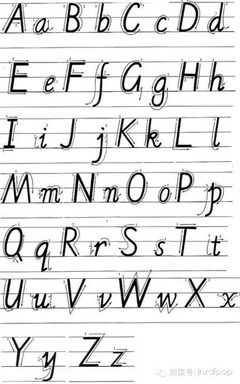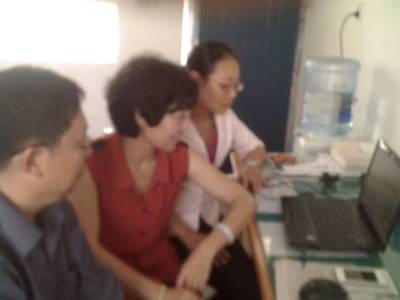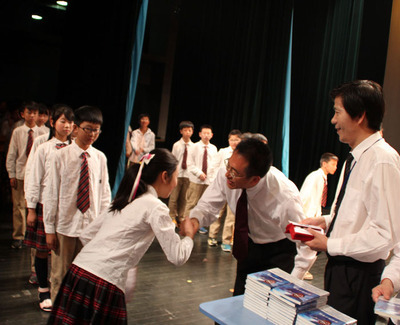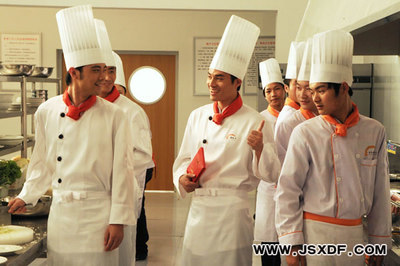三年级童鞋们看这里!
一、26个字母要记牢。
二、逢考必过秘籍在此哦!
1、向别人问好应该说――A: Hello! 你好! B: Hi! 你好!
2、问别人的名字应该说-――A:What’s your name? 你叫什么名字? B:My name’s ... . 我的名字是... 。
3、跟别人分手应该说――A: Bye. Good bye!See you.再见!
4、A: I have a ruleran eraser 我有一把尺子 一块橡皮。 B: Me too. 我也有。
5、早上相见应该说-――A: Good morning. 早上好!B: Good morning! 早上好!
6、下午相见应该说――A: Good afternoon! 下午好!B: Good afternoon! 下午好!
7、跟新朋友第一次见面――A: Nice to meet you! 见到你很高兴。 B: Nice to meet you,too! 见到你也很高兴!
8、A: This is Mr Jones. 这是琼斯 先生。 B: Nice to meet you! 见到你很高兴。
9、A: Colour it brown. 把它涂成棕色吧! B: Ok 好。
10、A: Let’s go to school! 让我们一起去上学! B: OK! 好的。
11、看见久未见面的朋友或者别人身体不舒服,你该这么打招呼-A: How are you ? 你好吗?
B: Fine,thank you .我很好,谢谢你。
也可以这样回答:Very well, thanks.
12、A: Let’s paint. 让我们画画。 B. Ok. 好。
13. A: Let’s play. 让我们玩。 B: Ok. 好。
14. A: Let’s make a puppet! 让我们做一个木偶。
B: Great! 好极了!
15. A: What’s that? 那是什么? B: It’s an elephant. 那是一只大象。
16. A: What’s this? 这是什么? B:It’s a bear. 它是一只熊。
17. A: I like it. 我喜欢它。 B: Thanks. 多谢。
18. A: I’d like some juice, please. 请给我一些果汁。
B: Here you are. 给你。
19、A: Can I have some water, please? 请给我一些水,好吗? B: Here you are. 给你。
20、 A: Here you are 给你。 B: Thank you. 谢谢你。
21、A: Thank you. 谢谢你。 B: You're welcome. 别客气。
22、A: Have some milk. 喝一些牛奶。 B: Thank you. 谢谢你。
23、A:This one , please. 请给我这个。 B: Sure. 好的。
24、A: How many plates? 多少个盘子? B: Five. 5个。
25、A:B: Happy birthday. 生日快乐! B: Thank you. 谢谢。
26、A: How old are you? 你多大了? B: I’m six years old. 我6岁了。
27、A: Let's eat the birthday cake. 让我们吃蛋糕。 B: Great! 棒极了!
四年级同学们看我看我看我!
一、常见句型不能忘。
1.询问物品的位置:
询问单数:---Where is it ?
---It’snear/on/in/under the window
询问复数---Where are the keys? 钥匙在哪里?
---They’re in the door. 他们在门里。:
where 引导的是特殊疑问句, “哪里” ,看到 where 就要想到地点,方位词,例如 on, in ,under, near 等
2、询问物品:
---What’s in theclassroom? (教室里有什么?)
---One blackboard,one TV, many desks and chairs.
(一块黑板,一台电视,许多的桌子和椅子。
3、--- Let’sclean the classroom!
Let me clean the window.
---OK. (好)/Great./Good idea. :
let’s = let us 让我们; let me让我
4、---Let me help you. (让我帮你吧!)
---Thank you. (谢谢你。)
5、---We have a new classroom. (我们有了一间新的教室。)
---Really? 真的吗?
6 .---What colouris it?(它是什么的?)
---It’s blue and white.(它是蓝白色的。)
what colour 引导的也是特殊疑问句,问的是颜色,回答中肯定有例如 purple, red 等等表示颜色的词。
7.---Here it is! (它在这儿。)
---Thank you so much! (非常感谢。)
8. ---Is she in the living room ? 她在客厅里吗?
---No , she isn’t. / Yes, she is.
---Arethey near the phone ?它们在电话旁边吗?
---No , they aren’t . / Yes, they are:
用 is/are 开头的句子属于一般疑问句,回答是 yes 或者 no,
9.询问他人对食物的喜好:
---What would you like ? 你想吃什么?
---I’d like some soup and bread, please 我想喝汤,吃面包。
10. 征求他人的用餐意愿:
---Would you like some soup? 你想要一些汤吗?
---Yes, please./No,thanks.
11.询问他人家里有几口人:
--- How many people are there in your family?
---Three.三口人。
以 How many 引导的是特殊疑问句,问的是多少,many 后面要加名词复数。要用数字回答。
例如:---How many apples are there on the tree?树上有多少个苹果?
---22
12.猜测家人身份:
---Is this your uncle? 这是你叔叔吗?
---No, it isn’t. / Yes, it is.
13.询问家人工作:
---What’s your aunt’s / her job?
---She’s a nurse.
问的是职业,回答会出现有关职业的词,例如 teacher, farmer 等。
14. ---A boy orgirl? 男孩还是女孩?
---A boy. 男孩。
15. ---What’s his/her name ? 他/她叫什么名字?
---His/Her name is….他/她叫….。
16.---Who is he/she?他/她是谁?
--- His/Her name is…
He/ Sheis …
17. ---Help yourself. 请随便吃…
---Thank you .
18. ---Can I have a knife and fork, please? (我能用刀和叉吗?)
--- Yes /Sure, here you are.
Yes,But try chopsticks for noodles.
19.描述朋友外貌:
He is tall and strong .他又高又壮。
20.描述朋友部位及穿戴:
My friend has glasses and his shoes are blue. 、
21、当你麻烦或打扰别人时要说:Excuse me, …
22. ---Do you like maths ?
---Yes,I do./No,I don’t.
23. ---MerryChristmas!
---Merry Christmas!
五年级同学们看我就对了!
一、重点句型,心中有数。
1.-谁是你的英语老师? - Carter先生。
- Who’s your English teacher? - Mr. Carter.
2.- 他长得什么样? - 他高而强壮。
- What’s he like ? - He’s tall and strong .
3.- 今天星期几?
- 星期二。
- What day is it today?
- It’s Tuesday.
4.- 星期二你们有什么课? - 我们有数学和科学课。
- What do you have on Tuesdays?
- We have math and science.
5.- 星期六你常常干些什么?
- 我看电视做作业。 - 你呢?
- 我也做作业。
- What do you do on Saturdays? - I watch TV and do homework. - What about you? - I do my homework, too.
6.-星期一你们午饭吃什么? - 我们吃西红柿,土豆和鱼.
- What do you have for lunch on Mondays?
- We have tomatoes, potatoes and fish.
7.- 你最喜欢的水果是什么? - 我喜欢苹果
- What’s your favourite fruit? - I like apples .
8.- 你会干什么? - 我会做饭。
- What can you do? - I can cook the meals.
9.- 你会铺床吗? - 不,我不会。
- Can you make the bed? - No, I can’t.
10. - 你会扫地吗?
- 是的,我会。
- Can you sweep the floor? - Yes, I can.
11.我房间里有一面镜子,两把椅子和一个大衣橱。
There is a mirror, two chairs and a big closet.
12.我家里有两间卧室,一间厨房和一间客厅。
There are two bedrooms, a kitchen and a living room.
13.衣橱在桌子旁边。The closet is near the table.
许多衣服在衣橱里。 Many clothes are in the closet.
垃圾箱在门后。 The trash bin is behind the door.
14.- 公园里面有一个森林吗? - 是的,有。 - 不,没有。
- Is there a forest in the park? - Yes, there is. - No, there isn’t.
15.- 山里有熊猫吗? - 是的,有。
- 不,没有。
- Are there any pandas in the mountains?
- Yes, there are.
- No, there aren’t.
二、必会知识点,你都记住了吗?
1. be like与do like
What’s …like?是问某某长得什么样子, 它的答语一般用:He/She/ It is + 描写人的外貌特征的词
如:- What’s your father like? 你爸爸长得什么样子? - He is very strong. 而在do like的句子中,like的意思是“喜欢”的意思。
如:- What does your father like? 你爸爸喜欢什么? - He likes apples.
2. 介词in, on ,at
1)表示在某年或某月(当只有年和月的时候),用in. 如:in May在五月 In 1988在1988年
2)表示在某段时间,如在上午,下午,晚上用in. 如:in the morning, in the afternoon, in the evening
3)表示在某日,在星期几时,用on。 如:on Monday, on Sunday on the 15th September 在9月15日
4)表示在几点几分,在具体时间用at.如:at 6:30, at 9 o’clock.
3. Today is Sunday. I like Sundays.
在这个句子中,前一个星期日Sunday是特指“今天是星期一”,用单数形式,
后一个星期日Sundays是泛指所有的星期日,用复数形式。
4. some与any的区别:
1) some 用于肯定句。但当表示请求、邀请、语气委婉,希望对方得到对方肯定回答时,可用于疑问

句,此时句中常出现情态动词 can, may, could, would. any 用于否定句和疑问句。 如: - Could I have some meat?
- Sorry, you can't have any meat. There isn't any.
2))如果名词前有冠词、指示代词、物主代词等限定词修饰时,则只能用 some of,表示“……中的一些。如:
Some of your teachers are not young.
3)any 也可用在肯定句中, 此时后面接可数名词的单数, 意为 “任何一个”。如:
You can ask any student in our class.
5. I have eggplant and tomatoes for lunch. 我午饭吃茄子和西红柿。
这里的eggplant是指一道菜,是被切碎了的,熟的,这里的eggplant是不可数名词,不能用复数形式。
6. There be句型中,be动词和其最近的名词保持一致 如果最近的名词是单数,用There is 如果最近的名词是复数,用There are
如:There is a mirror and two pictures on the wall. 墙上有一面镜子和两幅画。 There are two pictures and a mirror on the wall. 墙上有两幅画和一面镜子。
7. on与over的区别
on: 在……上面,表示与下面的物体相互接触,紧挨着,如:There is a book on the table. over: 在…上面,表示与下面的物体没有接触,悬空着,如:There is a bridge over the river.
六年级同学们别忘了我呀!
一、句型+语法,百战百胜就是这么灵!
1.How do you go to school? Usually I go to school on foot.Sometimes I go by bike.
How can I get to Zhongshan Park? You can go by the No.15 bus.
语法时态:一般现在时
句型:
1). How 引导的特殊疑问句,围绕人们的出行方式展开交际:--- How do you + 行为活动?--- I + 行为活动 + 出行方式。例:
A: How do you goto school? B: I usually go to school on foot.
2). How 引导的特殊疑问句,外出问路:--- How can I get to + 目的地?--- Youcan go + 交通方式。例:
A: How can I get to Zhongshan park? B: You can go by the No. 15 bus.
2.Where is thecinema, please? It’s next to the hospital.
Is it far from here? No, it’s not far.
Turn left at the cinema, then go straight. It’s on the left.
语法时态:一般现在时
句型:
1). Where 引导的特殊疑问句,就建筑物的位置进行问答:--- Where is + 建筑物? --- It's next to + 建筑物。例:
A: Where is thecinema, please? B:It's next to the hospital.
2). 祈使句,外出活动。例:Turn left at the cinema, then go straight.
3.
1) What are you goingto do on the weekend?
I’m going to visit my grandparents this weekend. I’m going to thecinema.
2)Where are you going this afternoon? I’m going to the bookstore.
3)What are you going to buy?
I am going to buy a book.
4)When are you going? I am going at 3 o’ clock.
What/ where/ when is sb. going…?
句型时态:一般将来时
句型:What, Where, When等引导的特殊疑问句,对将要进行的活动等进行问答:--- What are you doing to do + 时间?--- I'm going to + 行为活动。---Where / When are you going? --- I'm going + 地点 / 时间。例:
A: What are you going to do on the weekend?
B: I'm going to visit my grandparents this weekend.
4.What is your hobby? I like collecting stamps.
What is her/ his hobby? She/ He likes collecting stamps.
Does she teach English? Yes, she does. / No, she doesn’t.
语法时态:一般现在时、第三人称单数
句型:
1).What 引导的特殊疑问句,互相交流各自的兴趣爱好:--- What's your hobby? --- I like + 行为活动(doing)。例:
A: What's yourhobby?
B: I like collecting stamps.
2). 第三人称单数作主语:He / She + 动词的第三人称单数形式(does)。例:
He likes collecting stamps, too.
3). Does 引导的一般疑问句,用来确定自己对事情的判断:--- Does he / she + 动词原形?--- Yes, he / she does. No, he / she doesn't. 例:
A: Does she teach English?
B: No, she doesn't.
5.What does she/ he do? She/ He is a/an …
What are you goingto be? I am going to be …
Where does she work? She works in a car company.
How does she go towork? She goes to work by bus.
Who works in a carfactory? Wang Li.
语法时态:一般现在时
句型:
1).What引导的特殊疑问句,询问他人的职业:--What does + 第三人称单数 + do? --- She / He + 动词的第三人称单数形式。例:
A: What does your mother do?
B: She is a TVreporter.
2).综合运用What, Where, How等疑问词,询问他人(第三人称)有关工作的情况:--- What / Where / How ... + does + he / she + 动词原形(do)? --- He / She + 动词的第三人称单数形式(does). 例:
A: How does she goto work?
B:She goes to work by bus.
Ok,知识点总结就到这里,快快转发给更多的小伙伴们分享吧。期末考试尽在掌握中~
 爱华网
爱华网



